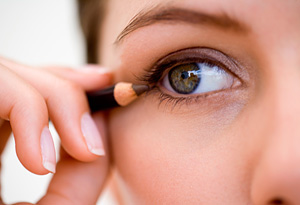Is Your Makeup Making You Sick?

Two teenage patients, both with pink eye. Dr. Elise Brisco quickly ruled out a recent respiratory infection for either of them or a case of conjunctivitis spreading at the girls' Los Angeles high school. So the optometrist asked the next logical question: Do you share makeup? Bingo. The cosmetics intended to make their lashes long and sultry had instead infected their eyes with an itchy, reddening virus. "Bacteria loves a warm, wet area, and the eyes are a breeding ground for that because they are an exposed organ," says Dr. Brisco, who runs the optical center Hollywood Vision. "Your body may be used to certain types of bacteria, but not those that you get from using another person's eye makeup." Antibiotic drops healed the pink eye. The teens were lucky; one swipe of an eye pencil can spread a more serious virus, such as herpes, which stays with you for life.
Even if you never share mascara, your own makeup could be playing host to bacteria that's multiplying as you read this. While the health risks are relatively low, they rise when it comes to mascara, since the eyes are the part of the face most susceptible to infection. "Women have no common knowledge when it comes to cosmetics," says Anne Carullo, senior vice president of corporate product innovation at Estée Lauder.
Part of that ignorance is due to the fact that many makeup brands don't include use-by dates on their packaging. Also, we rarely hear of people getting sick from rouge or gloss—so why worry about it, right? Besides, preservatives in foundation, lipsticks and cream eyeshadow typically keep the products fresh until they're used up.
Still, industry professionals see enough damage done by spoiled cosmetics to be alarmed. "I am astounded at how filthy women will allow their makeup bag to become before they buy a new one," says Jo Baker, a Los Angeles–based makeup artist. "Leaking goop is a magnet for germs." Jo has a reputation as a germophobe on shoots for magazines and commercials. She opens a new package of makeup sponges for each client and never reuses them. She wipes down her brushes and makeup kit with alcohol at the end of each day. "Actors get irritated eyes and sullen-looking skin from having unclean makeup put on them," Jo says. "That can happens to anyone who doesn't keep their makeup products clean."
Laurie Pike is the Style Director for Los Angeles magazine.
11 tips for avoiding bacteria and extending the shelf life of your products
Even if you never share mascara, your own makeup could be playing host to bacteria that's multiplying as you read this. While the health risks are relatively low, they rise when it comes to mascara, since the eyes are the part of the face most susceptible to infection. "Women have no common knowledge when it comes to cosmetics," says Anne Carullo, senior vice president of corporate product innovation at Estée Lauder.
Part of that ignorance is due to the fact that many makeup brands don't include use-by dates on their packaging. Also, we rarely hear of people getting sick from rouge or gloss—so why worry about it, right? Besides, preservatives in foundation, lipsticks and cream eyeshadow typically keep the products fresh until they're used up.
Still, industry professionals see enough damage done by spoiled cosmetics to be alarmed. "I am astounded at how filthy women will allow their makeup bag to become before they buy a new one," says Jo Baker, a Los Angeles–based makeup artist. "Leaking goop is a magnet for germs." Jo has a reputation as a germophobe on shoots for magazines and commercials. She opens a new package of makeup sponges for each client and never reuses them. She wipes down her brushes and makeup kit with alcohol at the end of each day. "Actors get irritated eyes and sullen-looking skin from having unclean makeup put on them," Jo says. "That can happens to anyone who doesn't keep their makeup products clean."
Laurie Pike is the Style Director for Los Angeles magazine.
11 tips for avoiding bacteria and extending the shelf life of your products



